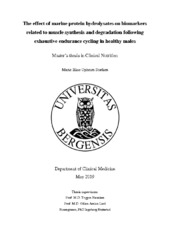| dc.description.abstract | ABSTRACT Background: To maintain the balance between muscle anabolism and catabolism by influencing the muscle protein synthesis and degradation is crucial to several catabolic diseases to avoid muscle wasting. Previous studies have proposed that marine protein hydrolysates (MPH) have an increased influence on protein synthesis through faster absorption compared to whole proteins like whey, along with positive bioactive functions and other health benefits. Aim: The overall aim of this thesis is to investigate whether an intake of 20 mg/kg body weight of MPH made from Atlantic cod could have a potential impact on biomarkers related to muscle synthesis and degradation following exhaustive endurance cycling in healthy males. Methods: This intervention study was performed as a double blind, randomized, placebo-controlled pilot study with crossover design divided into three phases over three separate test days. In total, 14 healthy male volunteers, medium trained and between 40 to 58 years of age were recruited. Phase one consisted of physical assessment and a maximal exercise test. Phase two and three involved the intervention where participants preformed two exhaustive endurance cycling sessions and the ingestion of the intervention drink. The intervention drinks were either MPH or placebo and was only ingested after the first session followed by a standardized meal. Collection of urine was performed to analyze the nitrogen balance, 1-Methylhistidine (1-MH), 3-Methylhistidine (3-MH) and the ratio between 3-MH and creatinine (3-MH/ Creatinine). Blood were collected within the same time intervals throughout both test days whereas 1-MH, 3-MH, creatinine, creatine kinase (CK) and retinol-binding protein 4 (RBP4) were all analyzed. Results: Urine analysis showed no significant differences between the intake of MPH compared to placebo in nitrogen metabolized (p = 0.315), nor in the 3-MH/ Creatinine ratio (p = 0.066). The ratio between 1-MH and 3-MH (1- MH/ 3-MH) gave a significant result (p = 0.028), however multiple testing showed no significant difference (p = 0.107). Linear mixed regression analysis of blood resulted in no significant difference between the two drinks in CK (p = 0.823), 1-MH/ 3-MH (p = 0.595), 3-MH/ Creatinine (p = 0.662) nor RBP4 (p = 0.052). Conclusion: This study has demonstrated the need to further explore and investigate the use of MPH as a supplement to increase muscle synthesis and decrease muscle degradation in humans. Even though this study did not find any significant effect of a single dose containing small amounts of MPH on muscle synthesis and degradation, several results did suggest that there might be improvement through increased protein synthesis with the usage of MPH. | en_US |
